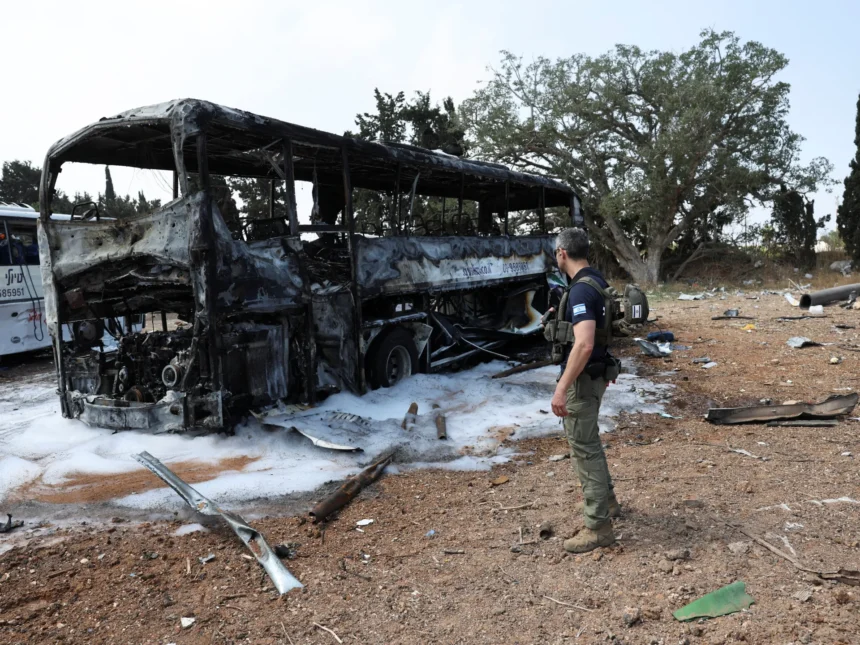- Blasts rock Tehran and missiles hit Tel Aviv as Israel and Iran exchange deadly attacks for a fifth-straight day.
- The Israeli military claims killing Iran’s wartime chief of staff after Iranian media say preparations under way for what they call the largest and most intense missile attack on Israeli soil.
- US President Donald Trump says he is seeking a “real end” to the conflict and “not a ceasefire”, after issuing a warning on social media urging Tehran’s residents to flee while vowing Iran cannot have a nuclear weapon.
- Israeli Prime Minister Benjamin Netanyahu says killing Iranian Supreme Leader Ayatollah Ali Khamenei would not escalate hostilities, but would “end the conflict”.
- The death toll from Israel’s attacks on Iran has risen to more than 220, including 70 women and children. More than 20 people have been killed in Iranian attacks on Israel.
- Meanwhile, Israel’s war on Gaza has killed at least 55,432 people and wounded 128,923, according to Gaza’s Health Ministry. An estimated 1,139 people were killed in Israel during the October 7 attacks and more than 200 taken captive.
In Israel, only about five people have been reported injured so far, treated for light injuries sustained while trying to get to the shelters during the last volley of ballistic missiles launched from Iran.
Still, we were able to see images of buses on fire and direct impacts were reported in the larger Tel Aviv area but also in Herzilya.
In Herzilya, the Israeli military censor has forbidden the publication of images and information about that site, classifying it as sensitive – that
usually means that it’s either a military, intelligence or strategic asset or site that the Israeli military censor does not want to disclose.
Overnight, there has been a tightening of the restrictions so the information is difficult to verify.
Having said, Iran’s IRGC said in a recent statement that they targeted the intelligence buildings in Herzilya, the Mossad and Aman military intelligence, so that claim remains unanswered from the Israeli side.
For now, the war will most likely continue in the sky’
We’ve spoken to Marina Miron, a military analyst and researcher in the War Studies Department at King’s College London, about whether the conflict could escalate from being a war of the skies to on-the-ground fighting.
Here’s what she said:
“Of course have to consider every scenario even if it’s not very possible, or the probability is very low for it, but I would for now, at least exclude a clash of land forces of both armies.
“And we have to bear in mind that Iran is about nine times bigger than Israel – so it has much more potential, it is less compact. The question would be, on which territory would such a clash take place? It could be Iraq, could be Syria. So, it is complicated.
“But for now, the war will most likely continue in the sky, with Israel having more advanced, or very advanced, air power capabilities, using US F-35s, modified F-35s against the somewhat antiquated Iranian air defences.
“However, Iran has a strength in terms of its missile programme, which has been going on for decades now, and despite the sanctions, the Iranians have managed to produce quite a lot of variants, including the Fattah-1, which is believed to be a hypersonic missile.”
Israel’s defence minister says Iran’s Khamenei could face same fate as Saddam Hussein
Israel Katz warns that Supreme Leader Ali Khamenei could meet the same end as Saddam Hussein, the leader of Iraq who was ousted and executed after the 2003 US-led invasion of his country.
“I warn the Iranian dictator against continuing to commit war crimes and launching missiles at Israeli civilians,” Katz said, according to local media.
Officials in Iran said dozens of Iranian civilians have been killed since Israel began launching attacks on the country on Friday.
“He [Khamenei] would do well to remember the fate of the dictator in the country neighbouring Iran who chose this same path against the state of Israel,” Katz added.
“We will continue today as well to act against regime and military targets in Tehran,” Katz added, repeating Israeli threats for residents to leave Tehran.
Trump’s mixed signals part of ‘psychological warfare’ against Iran
The US president is engaging in psychological warfare with his conflicting comments on the Israel-Iran confrontation, says Adel Abdel Ghafar from the Middle East Council on Global Affairs.
“Things can escalate, but I think ultimately President Trump wants this to wind down because if US facilities are attacked, if the Strait of Hormuz is closed, there’s going to be an impact on the US economy and the global economy,” he told Al Jazeera.
A war in the Middle East will not serve Trump’s interests of economic growth, Ghafar said. Israel, however, has its own agenda, including Netanyahu “fighting for his political survival and wanting perpetual war”.
Other Israeli objectives include “some sort of regime change” in Iran and “pulling the world’s attention away from Gaza”, he added.
“We have the use of famine as a tool of war, which is clearly a war crime. But unfortunately, now the world’s attention is focused on the conflict between Iran and Israel and not on the crisis in Gaza.”
